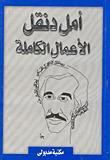b. 1940, Qina, Egypt; d. 1983, Cairo, Egypt
The "Complete Works of the Poet Amal Donkol" was our book club selection for July 2011.
Find more information on our July 2011 book on the book's page.
This Egyptian poet has gained prominence as one of the most innovative Arab poets of the twentieth century. Born in the Upper Egypt village of Qina to an al-Azahar graduate who taught Arabic and composed poetry, Dunqul read the copious collections of classical Arabic poetry available on his father’s bookshelves. After finishing high school, Dunqul moved to Cairo to study Arabic at Cairo University, but soon left without obtaining a degree. Starting his poetic career at the age of 18, Dunqul published six collections of poetry.
The distinctiveness of his style is described as well structured, lucid, symbolic, and musical. His poetry, nationalistic in tone, gave voice to the angry revolutionists across the Arab world. ‘Al-Bukā’ Bayna Yaday Zarqā’ al-Yamāma (Weeping before Zarqa’ al-Yamama) (1969), a commonly celebrated poem by critics and readers, laments the defeat of the Arab countries in the war ofJune 1967. His work employs Arab heritage to depict the bitterness and agony felt by Arabs after the defeat. Regarded as one of his most memorable poems, Lā Tusāli (Do Not Make Peace) (1976), was an appeal to Sādāt not to wound the pride of Arabs by making peace with Israel, commonly viewed as a brutal betrayal. Dunqul died in 1983, after a long struggle with cancer.
Amal Dunqul
EgyptUpcoming Events

Arabia Felix - Alarabia Alsaida in Bayt Yakan
April 15, 2025
Arabia Felix by Thorkild Hansen, and translated by...

A writer, a vision, a journey: a conversation with Professor Ilan Pappe
March 15, 2025
This event took place on 15 March, 2025 . You may...

مسافر يبحث عن ماء
February 17, 2025
تقيم نقابة اتحاد كتاب مصرشعبة أدب الرحلات تحت رعاي...

Online discussion of The Vegetarian by Han Kang Nobel Prize winner 2024
November 08, 2024
This discussion of Han Kang’s The Vegetarian...

